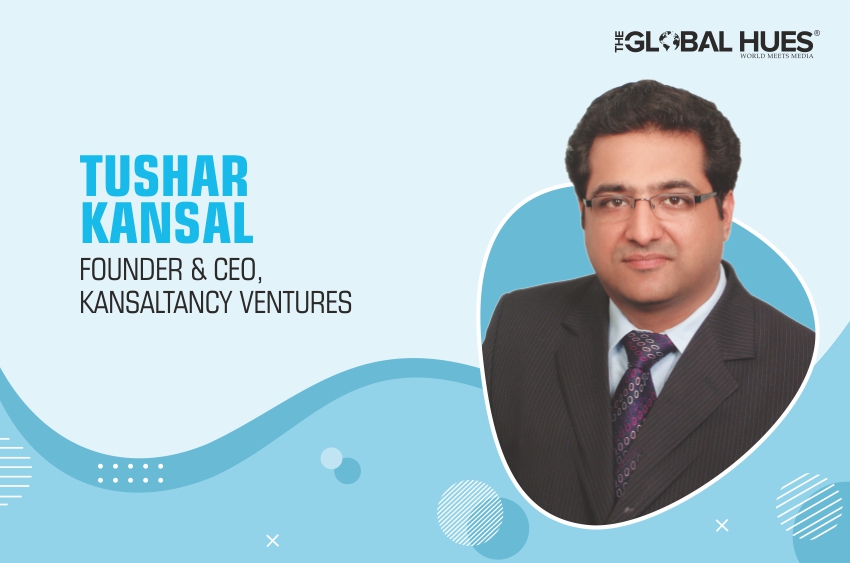“Passionate entrepreneurs need to find the established investors to help them achieve their goals and contribute significant value to their organization.”
Tushar Kansal (Founder & CEO, Kansaltancy Ventures)
A Consummate Professional, an Intellectual Leader, and a Thought Influencer, Tushar Kansal is the Founder and CEO of a highly successful investment management firm Kansaltancy Ventures. His experience spans multiple industries from Venture Capital (Brand Cap), Big 4 Consulting (Deloitte & Touche), LSE-listed Sistema’s India unit (MTS India) to CFO of Guggenheim Partners-owned company (DLI).
Tushar has executed several Venture Capital deals at Deloitte and Brand Cap and raised USD 2.5 billion for MTS in 3 years. At DLI, he has reported to the Founder Guggenheim, the USD 200 billion US PE Fund. He is also the mentor and judge of several Startup events at Entrepreneurship cells of top Academic Institutions such as IIT-Mumbai, IIT-Delhi, IIT-Chennai, IIT-Kharagpur, IIT ISM-Dhanbad & such marquee institutions.
Furthermore, he is a Venture Advisor with Loyal VC, the INSEAD-led Canadian VC Fund, having a core portfolio of over 200 investments in more than 46 countries. Over the years, he has supported Startups & growth-stage companies in diverse sectors like EdTech, FinTech, Consumer B2C, B2B & D2C, AgriTech, Disruptive & DeepTech as well as non-tech sectors.
In an exclusive conversation, Tushar Kansal shared insights about his career, the brand, and many more.
-
How did you begin your career? Was it in conjunction with the present role that you have taken up?
My career started when I got campus placement from Engineering College at Indo Rama Synthetics, a big poly-staple fibre manufacturing company at Nagpur but I soon realized that I wanted to work in either an IT or Finance field. Therefore, I persistently prepared for MBA Entrance examinations and got through MBA in Finance at the University of Delhi. I got campus placement in the M&A division of SBI Capital but post my MBA, I Co-Founded an education company called KITES which trained high school students for IIT entrance examinations. The company grew to 800 students and 3 centers in North Delhi and I got a very good exit when we sold it to Narayana Institute in 2006.
For the last decade, I have been in different leadership roles, driving business, with big companies as an entrepreneur. At Deloitte, I executed Private Equity assignments/ Valuations & Financial Advisory. At Brand Capital, I was part of the team investing across companies. At MTS India, as head of the Debt division, I was instrumental in raising almost $2.5 billion of debt in 3 years and handled all round Financial goals as CFO of DLI, including compliances towards the PE Fund Guggenheim, as the main investor and owner.
I am also the Founder of Kansaltancy Ventures, an Investment Management firm. All these different roles have deeply helped me in sculpturing my current professional journey.
-
Take us through your journey of becoming an entrepreneur.
I founded a startup called Indus B2C Global in 2013 into the B2B consumer space; the core product being Human Hair extensions. While running this startup, I realized the gaps between what startups need and what they are offered by the companies.
I quit full-time management of this startup and became a financial investor. That’s when I launched Kansaltancy Ventures with an aim to assist startups and growth-stage companies with equity fundraising, debt, mergers, and acquisitions, and mentoring.
A large part of my work at Kansaltancy Ventures is doing webinars and helping Founders and team members of aspiring startups, reach their goals.
-
Give a brief about Kansaltancy Ventures. What are its core offerings?
Founded in 2006, Kansaltancy Ventures is an investment management and advisory firm that deals in Equity fundraising, fundraising for VC Funds, Debt, and Mergers & Acquisitions. The firm aims at facilitating growth across global tech & non-tech sectors by its network, domain specialization, and investments from 650+ global VC relationships. Some of the verticals of the company are:
- Funding: Equity & Structured Debt Planning & Pitching to Investors
- Mergers & Acquisitions
- Pitch Deck Preparations & Presentations
- Business Plans & Project Plans Preparations
- Start-Ups & Growth Strategies & Planning
- Go-To-Market & Digital Marketing Strategies
- Financial Strategic Planning & Analysis
- Strategic Planning & Execution Advisory
- Business Valuations Advisory
-
What is your Superpower?
In times of uncertainty or disaster, having an agile mindset allows me to quickly adapt to changing circumstances.
One of the things I’d say is important is the ability to develop a competent team because a firm cannot be run by a single person. It’s also a skill to bring people to the table who have the skills you lack.
Endurance, strength, and resilience are the keys to accomplishing challenges despite adversity.
Observation– I have a keen eye for detail and the ability to take a step back and assess a situation before responding to the evidence.
Speed and efficiency are very important. The ability to manage my time, as well as the ability to spot ways to enhance processes and complete work more quickly, are crucial skills.
Sensitivity to the thoughts and feelings of others. I may not be able to read people’s minds, but emotional intelligence is a valuable skill in the workplace. The ability to shape your surroundings.
Decisiveness– Excellent leaders understand the power of decisiveness, while others pride themselves on being great thinkers. I observe and evaluate before acting promptly and boldly without second-guessing my decisions. Even if I make a mistake now and again, I’ll still outperform those who are hesitant to act.
Tenacity- If I could only have one leadership superpower, this would be Tenacity. It’s the deciding factor in prospects of success. Character is demonstrated when everything around you is coming apart and you respond with courage, tenacity, and strength. The highest power is true character.
Moreover, it is my passion for my profession that motivates me to take my firm to new heights.
-
Tell us, what SaaS markets and areas do you invest in and why?
These days, it’s hard to find a laptop with a drive and SaaS is a major part of the reason. One aspect of cloud computing is SaaS. Its main function is to offer software applications over the internet, usually as a subscription service.
Lower upfront expenses, quick configuration, scalability, and total simplicity of use are key advantages of SaaS. That is why I believe SaaS is getting momentum so quickly. SaaS has been nothing short of revolutionary, and it’s bringing in the funds. While SaaS has shifted the way we do almost everything, it isn’t finished altering the world. That’s not even close.
There are a few trends on the horizon that might use the cloud to make business and everyday life faster, easier, better, and more economical.
AI is one of the most influential tools in SaaS, and software developers are progressively integrating it into all aspects of life. Like Tractable, an artificial intelligence company has adopted AI as a means of assisting automakers in swiftly and accurately assessing damage following an accident. It uses a computer vision algorithm to do the task.
Another trend impacting SaaS is mobile-first, customers can do everything on their smartphones. Micro SaaS appears to be gaining momentum as well. These businesses concentrate on solving problems efficiently, usually in a niche market.
Migration to PaaS (Platform-as-a-Service), a concept used by Amazon Web Services and Microsoft Azure, and the idea of unbundling, which allows SaaS firms to break out fundamental elements of their service to meet the demands of customers.
The horizontal SaaS is dominating the market right now, companies like Adobe, Zoom, Microsoft, SurveyMonkey have been growing consistently.
The SaaS market has exploded in recent years with certain twists and turns because of the accelerated digital transformation due to COVID.
-
What Trends are happening that people aren’t paying attention to?
People haven’t taken into account the fact that the market hasn’t yet recovered post-Covid. The market will not rebound as quickly, not unless the economy does.
People are becoming increasingly restless as they do not want to miss out on a firm that offers good returns, therefore they continue to invest in various companies, resulting in an unbalanced portfolio.
As Warren Buffet says, “if you can’t hold a stock for ten years, don’t hold it for ten minutes”. If you’re looking for a long-term investment, I believe you should have faith in the company you’ve chosen. Give it some time, it’s not possible to get returns on investment the day you make it.
The digitization and virtualization of business and society will continue to accelerate. However, the demand for sustainability, ever-increasing data volumes, and faster computation and network speeds will reclaim their position as the most essential drivers of digital transformation. As the focus moves from merely surviving in a changing environment to thriving in it, we will definitely continue to exploit this increasing openness to flexibility, agility, and innovative thinking as a community.
Artificial intelligence – From voice assistants to language translation to tools that allow us to extract structured data from pictures, whiteboard scribbles, and hand-written notes, AI has invaded the tools we use to carry out our everyday work. It also drives a lot of the robotic process automation that has helped admin, logistics, accounting, and HR departments lessen their duties.
Moreover, Data and technology are being democratised. In recent years, an entire industry has sprung up with the goal of putting the knowledge and tools needed for tech-led innovation. Cloud solutions for storage, networking, and computing reduce costs and the risks of building up expensive equipment to test new ideas.
Many of us have witnessed the virtualization of our offices and workplaces in the past two years. This will be a longer-term trend. We will become more familiar with the concept of a “Metaverse” in 2022, which refers to permanent digital realms that exist alongside the physical world we live in.
-
When it comes to investing, what Founder Characteristics do you look for?
Before investing, I believe we all look for basic attributes in a founder, such as if the founder has a clear vision for the company and its trajectory, and whether they are enthusiastic and tenacious.
Perseverance- Founders must be able to get back up after being knocked down since starting a business is difficult. Time and time again. Can sell to consumers, top recruiters, and potential venture capitalists.
Prior experience, critical connections, or unique insights are all examples of skills, background, or insights that offer you an upper hand.
I look for a Thinker and communicator who really is clear and concise.
Self-awareness and a motivation to grow, learn and improve – Except for those who accept they are not perfect and seek aid and knowledge when they need it, Keeping an open mind. Data-driven decision-making. Works hard and clever. I also enjoy working with those that aren’t afraid of conflict.
-
What Differentiating Factors do you look for in a company to add to your portfolio?
There are several aspects to consider. First and foremost, the individuals that run the company, the professional managers. It makes sense to stick with companies that have price power because of their company model, products, and market.
There is no doubt, a company stands out if it’s a well-known brand, in the long-run public preferences are a little tilted towards the well-established brands.
The regulatory environment is also crucial; regulators play an important role, and a change in the regulatory framework or government policies can have a significant impact.
These characteristics, in my opinion, distinguish an enterprise.
-
Share with us, how can someone spot the Right Investment(s)?
Spotting the right investments in Private/ Unlisted companies:
To invest in a Startup, you need a lot of Financial capital, Human capital, no matter how you define it. Ordinary investors can now easily participate in interesting Startup opportunities through crowdfunding portals.
Although Startup investing has the potential to be rewarding, it must be understood that it also carries significant dangers. Even if you do your homework, you could end up with nothing if the Startup fails. Startup investment involves Entrepreneurs exploring a novel idea.
Secondly, Connections with People. Perhaps your Brother or a neighbour is launching a fantastic new product. It appears to be a novel concept. A lot of individuals invest in Startups because they’re part of a network and want to support a project they’re familiar with. It is advisable that you conduct an extensive study before investing.
Before investing in a Startup, you should know its industry, its products and whether the team is passionate enough to get an idea off the ground. The Startup should be familiar with the ins and breakaways of the industry in which they operate.
For Entrepreneurs, having a broad and growing market is critical. Companies will sometimes pursue a niche and design a product that is so narrowly focused that they will never be able to grow into a major corporation, even if they outperform their competition.
So, in order to make the best investment decision, you must first ask yourself these questions. Why is this the case? Why are you doing this now? Has anyone tried this before? Why hasn’t it happened yet? If that’s the case, why did it fail before?
Spotting the right investments in Listed companies:
The first step is to assess your own situation. Every person has a different level of risk tolerance; those with a low-risk tolerance should invest in blue-chip companies. Others who are willing to take on more risk in exchange for a higher return should include a few blue-chip companies simply to be safe. Now, the five most important aspects are dividends, P/E ratio, historical return, beta and earnings per share (EPS).
Dividends are a powerful way to boost your earnings. In addition, dividend payments are also a sign of a healthy company.
The best indicator of a stock’s worth is the P/E ratio. Well, there is no such thing as an ideal P/E ratio. Investors can, however, establish a baseline by comparing the P/E ratios of companies in the same industry.
If you want to hold equities while also minimising the impact of market movements, Beta is a smart measure to use.
EPS represents a company’s earnings, after taxes and preferred stock dividends, that is allocated to each share of common stock. This statistic can be used by investors to determine how successfully a firm can deliver value to its shareholders. If a company consistently fails to meet profit expectations, you should think twice about buying the shares.
After analysing these-
Decide what you want to invest for and then decide which investment account you should open and the degree of risk you should be taking.
Make a decision on your asset mix.
Your asset mix is the percentage of your portfolio you choose to dedicate to each.
Because shares are the riskiest investment, a portfolio made up of 90% stocks and 10% bonds would be riskier than a portfolio made up of 60% stocks, 30% bonds, and 10% cash.
A stock-heavy asset mix can make sense depending on where you are in your life cycle, especially if you want your investments to increase.
-
If you had to pick one company you are most proud that you invested in, which one would you pick and why?
There are two main criteria to answer this question: one can be the social reach and the benefit given by that company to the society and the other can be purely in the form of return.
Nykaa is my favourite Startup. Nykaa is an Indian company that specialises in multi-beauty and personal care items. It started off as a solo e-commerce platform before expanding into a variety of retail locations across the country.
For both women and men, the company specialises in providing a broad variety of cosmetics, skincare, haircare, perfumes, bath & body, luxury, and wellness items.
Falguni Nayar, an MBA graduate from IIM Ahmedabad, began working in investment banking at Kotak Mahindra immediately after graduation. She was promoted to Managing Director of the same division in 2005.
She worked for Kotak Mahindra for nearly 18 years. Later, she decided to branch out from banking and try her hand at other fields.
She saw the untapped potential of the online beauty industry. Since there was a shortage of accessible online brands and things that people could trust and purchase with confidence at the time, she saw an opportunity for Nykaa.
Falguni has shown us all that we are all capable of accomplishing everything we set our minds to, we just need to harness our abilities in the correct way. And I am thrilled to witness her achieve such greatness.
-
What areas are you most passionate about that you invested in?
I am most passionate about EdTech and D2C brands. In the last two years, we’ve observed a significant transition of education towards technology.
EdTech businesses, except BYJU’s, the world’s most valuable online education startup at $18 billion, have struggled to find investors. This has hampered their capacity to spend, particularly on client acquisition and marketing.
D2C brands are gaining popularity at a quick rate these days. These digital brand models are masters at cutting expenses and drawing clients quickly. They’re also succeeding as “Brands” in the conventional sense, recognizing unmet requirements among modern consumers.
Furthermore, the growth of the internet and social media has made it easier for them to sell and create brand awareness, giving D2C retail a huge boost.
I’ve recently been really interested in green stocks. It is no secret that the demand for global energy is growing. The need for coal, gas, and oil is huge, but because fossil fuels are limited, we must turn to new sources of energy. In the future, hydropower and solar will become the primary sources of energy. As a result, the future of renewable energy appears to be greener. Furthermore, green stocks, like gas, coal, and oil, are predicted to generate exceptionally high returns.
-
How do you feel Sales have changed in the last decade compared to today?
Sales are essential for every firm to grow, but especially for new entrepreneurs. The advantages of refining the sales process cannot be overstated; without sales savvy, gaining clients or investors to thrive in today’s competitive market will be difficult. After all, thanks to advancing technologies, sales have changed dramatically in recent years.
Globally, quarantines and curfews lead to a rise in internet commercial activity. With less foot traffic in stores, retailers and salespeople focus on enticing people to make online purchases to keep money flowing. People appear to have reacted, since internet sales have been steadily increasing since the Covid-19 outbreak. The percentage of online sales to total retail sales nearly doubled in less than a year.
Sales automation software and machine learning have been used in the B2B business, which has traditionally relied on human contact and face-to-face encounters but have changed since the pandemic.
Aside from technological advancements, there has been a general shift in how customers make purchasing decisions.
The rise of content marketing has also resulted in a significant shift in sales, as customers now conduct extensive research online before purchasing a product.
-
What do you think founders should be focused on when it comes to growth and revenue?
We all make the error of rushing after clients in the hopes of seeking them. Rather than focusing on acquiring new clients, focus on your existing core consumers. When you’re looking for funding, it’s important to concentrate on your existing market.
Secondly, risk is an inevitable component of doing business. We can’t control everything but can try to keep our risks at a minimum. In order to expand your firm, you must plan ahead.
Another piece of advice would be to concentrate on social media. Furthermore, building a stronger and highly competent team by hiring at both the executive and entry-level can also do wonders.
Lastly, I would advise Leaders & Founders to conduct thorough research on their competitors to develop a successful business strategy. There’s no such secret formula to instant success. Growth is a process that happens over time.
-
Do you believe founders should have an attitude of abundance or frugality when it comes to their investment funding?
I believe a Founder should have an attitude of frugality with a hint of abundance because only those who are careful with their money can make a company profitable, not those who spend like a five-year-old kid.
Now, by a tiny bit of abundance, I mean that they should not be concerned when resources are few. They must be calm in order to make several decisions, which they cannot do if they are distracted or furious. It would have an effect on their business. To get their business back on track, they’ll need to be resourceful. the scarcity mentality sees limitations instead of opportunities. Instead, turn those around to positive thoughts.
If you’re surrounded by people who think in terms of scarcity, you’ll need to find a way to resist that if you want to change careers. And Consider whether you look up to the folks you spend time with. If not, you might need to look for other people who are living the life you want.
-
What would you say to a Founder evaluating potential investment partners, what characteristics should they look for?
First of all, your investment partner should be a reliable person, it’s important to look for any red flags that might indicate that the person can’t be trusted.
Double-check if you desire the same things because giving up equity in a firm might cause decision-making paralysis because new investors may demand their business partners to act quickly.
Avoid getting tunnel vision when it comes to venture financing. The VC philosophy of “expand fast, exit fast” does not fit all businesses, especially those wanting to build a long-term enterprise. So look at all of your funding sources.
Confirm that your potential investors are truly interested in your success. The attraction of a large check may cause you to lose sight of what the investor truly desires. Consider the investment’s terms carefully.
Passionate entrepreneurs need to find the proper investors to help them achieve their goals and contribute significant value. It’s critical to conduct investor due diligence, just as the investors will.
It’s completely acceptable to request both success and failure stories from investors in order to learn from both circumstances and understand how the investors assisted in their resolution.
Another thing is if that person is comfortable with risk, you’ll probably come across situations where you’ll have to risk it.




